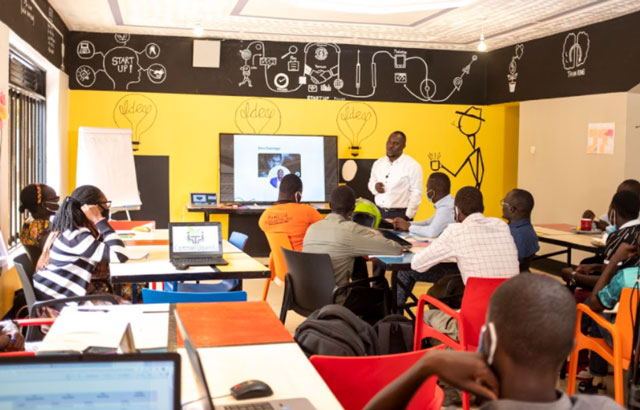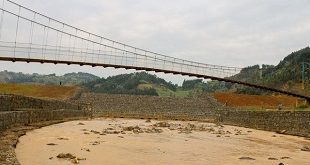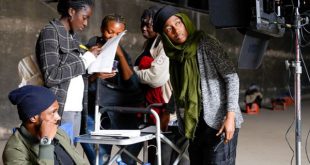
Corporations in Africa are at the forefront of a transformative revolution aimed at addressing the challenge of rising education costs, particularly in tertiary education, by providing essential resources to foster innovation across the continent.
SPECIAL REPORT | BIRD AGENCY | One example of a growing trend in Africa is splashed across a major freeway in Johannesburg: the Innovation Bridge, a pioneering collaboration between the University of Witwatersrand and platinum and rhodium miner, Sibanye-Stillwater.
Corporates across industries, from mining to banking, telecommunications to tech startups, are actively supporting education projects and scholarships in Africa, in an effort to ease the burden of funding on governments and individuals and help foster academic development.
In the case of the Innovation Bridge – a centenary project by the university that has seen the refurbishment of a bridge used by students to cross above the busy freeway – the project is just one element of a wider engagement of a corporate with the university.
The miner has also made available a further US$2.8 million for study bursaries, learnerships, and graduate internship programs within the University’s Faculty of Engineering and Built Environment.
According to Faith Nwaobia, a Nigerian educationist and edtech startup founder, affordability gaps are the biggest challenge limiting education continuity post-basic education levels. Sponsorships and other corporate support for centres of learning, are, he believes, both an investment and a sign of confidence in the future of a market and country and have the potential to transform education on the continent.
“Sponsorships are a form of private investment which can bring great change and growth in the educational landscape of Africa given the financing pressure on governments,” Nwaobia explained.
UNESCO estimates that African governments allocate on average about a quarter of their government expenditure to the education sector. But with a growing youth population, the challenges are enormous.
Neal Fromeman, CEO of Sibanye-Stillwater, sees a place for corporates to help with education and at the same time ensure that the skills they need, are developed locally.
“We join forces to shape the future of mining and create a lasting positive impact on our planet,” he said, in a statement unveiled by the university.
The University of the Witwatersrand (popularly known as Wits) has a proud history of engagement with engineering and mining firms. Sponsorships from early 20th Century mining houses helped build the imposing buildings and have funded courses and students for over a century.
Anglo American Platinum, another prominent mining giant operating in Africa whose early origins were entwined with the establishment of Wits, has pledged over US$55 million to enhance education in South Africa by 2027, partnering with the South Africa Department of Basic Education.
Launched in 2018, this initiative will benefit 100 Early Childhood Development sites and an additional 100 primary and secondary schools.
On a continental level, Standard Chartered, through its African subsidiaries, introduced the Futuremakers Initiative, which aims to raise US$78 million to support African youths in developing essential skills and capacities, while global tech company, Microsoft, through its Nairobi-headquartered Africa Development Centre, is running an active partnership with different universities in Kenya.
That program includes a review of current curriculums and the consequent tailoring of curriculums to achieve more consistency with industry needs.
Also, a 2022 partnership between Huawei Technologies and different African Universities will see about 1 million new ICT professionals trained on the latest market demands as part of their course training.
UNICEF estimates Africa needs 17 million additional teachers in order to meet the universal education targets of 2030 but only has the capacity to add less than 5 million using state funding systems.
This is despite governments on the continent pushing globally set financing targets for education.
Multinationals are not the only corporates investing their profits back into African education. African corporates such as Equity Group, MTN, Safaricom, and others have also made significant investments in supporting academia across different countries in the continent.
The rise of EdTech startups in Africa is also showing significant growth, with the number of funded companies rising by 25% between 2021 and 2022 alone.
Co-Creation Hub, one of Africa’s largest innovation hubs, in February 2023 announced the launch of a US$15 million accelerator program targeting EdTechs in Nigeria and Kenya in February.
In March, Egyptian EdTech, almentor.net, revealed it had raised US$10 million in its pre-series C round funding.
As Nwaobia outlined, startup and corporate initiatives play a pivotal role as they have the potential to create lasting impacts in Africa’s education sector.
“It is even more encouraging that these initiatives are beginning to come up now … past assessments have shown very little contributions of corporations in education mostly because of the lack of direct ROIs (return on investments),” he said.
As private corporations mature and recognise their benefits to their own bottom lines of bolstering educational institutions, the contributions of African corporates to research and academia will continue to soar, researchers said.
*****
SOURCE: bird story agency
 The Independent Uganda: You get the Truth we Pay the Price
The Independent Uganda: You get the Truth we Pay the Price


